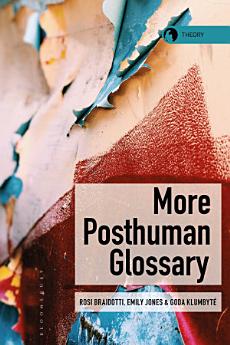More Posthuman Glossary
Rosi Braidotti · Emily Jones · Goda Klumbyte
નવે 2022 · Bloomsbury Publishing
ઇ-પુસ્તક
224
પેજ
reportરેટિંગ અને રિવ્યૂ ચકાસેલા નથી વધુ જાણો
આ ઇ-પુસ્તક વિશે
The notion of the posthuman continues to both intrigue and confuse, not least because of the huge number of ideas, theories and figures associated with this term. More Posthuman Glossary provides a way in to the dizzying array of posthuman concepts, providing vivid accounts of emerging terms. It is much more than a series of definitions, however, in that it seeks to imagine and predict what new terms might come into being as this exciting field continues to expand.
A follow-up volume to the brilliant interventions of Posthuman Glossary (2018), this book extends and elaborates on that work, particularly focusing on concepts of race, indigeneity and new ideas in radical ecology. It also includes new and emerging voices within the new humanities and multiple modes of communicating ideas.
This is an indispensible glossary for those who are exploring what the non-human, inhuman and posthuman might mean in the 21st century.
A follow-up volume to the brilliant interventions of Posthuman Glossary (2018), this book extends and elaborates on that work, particularly focusing on concepts of race, indigeneity and new ideas in radical ecology. It also includes new and emerging voices within the new humanities and multiple modes of communicating ideas.
This is an indispensible glossary for those who are exploring what the non-human, inhuman and posthuman might mean in the 21st century.
લેખક વિશે
Rosi Braidotti is Distinguished University Professor at Utrecht University, the Netherlands. Her publications include Patterns of Dissonance (1991), Metamorphoses (2002), Transpositions (2006), Nomadic Subjects (1994 and 2011), Nomadic Theory (2011), The Posthuman (2013), and Posthuman Knowledge (2019). She co-edited with Paul Gilroy Conflicting Humanities (2016) and with Maria Hlavajova The Posthuman Glossary (2018).
Emily Jones is Lecturer in Law at the University of Essex, UK. She is author (with G. Heathcote; S.Labenski and S.Bertotti) of The Law of War and Peace Volume 1 (2020) and Volume 2 (forthcoming 2023, Bloomsbury).
Goda Klumbyte is a Research Associate at the University of Kassel, Germany. Her research engages feminist science and technology studies and critical computing.
Emily Jones is Lecturer in Law at the University of Essex, UK. She is author (with G. Heathcote; S.Labenski and S.Bertotti) of The Law of War and Peace Volume 1 (2020) and Volume 2 (forthcoming 2023, Bloomsbury).
Goda Klumbyte is a Research Associate at the University of Kassel, Germany. Her research engages feminist science and technology studies and critical computing.
આ ઇ-પુસ્તકને રેટિંગ આપો
તમે શું વિચારો છો અમને જણાવો.
માહિતી વાંચવી
સ્માર્ટફોન અને ટૅબ્લેટ
Android અને iPad/iPhone માટે Google Play Books ઍપ ઇન્સ્ટૉલ કરો. તે તમારા એકાઉન્ટ સાથે ઑટોમૅટિક રીતે સિંક થાય છે અને તમને જ્યાં પણ હો ત્યાં તમને ઑનલાઇન અથવા ઑફલાઇન વાંચવાની મંજૂરી આપે છે.
લૅપટૉપ અને કમ્પ્યુટર
Google Play પર ખરીદેલ ઑડિઓબુકને તમે તમારા કમ્પ્યુટરના વેબ બ્રાઉઝરનો ઉપયોગ કરીને સાંભળી શકો છો.
eReaders અને અન્ય ડિવાઇસ
Kobo ઇ-રીડર જેવા ઇ-ઇંક ડિવાઇસ પર વાંચવા માટે, તમારે ફાઇલને ડાઉનલોડ કરીને તમારા ડિવાઇસ પર ટ્રાન્સફર કરવાની જરૂર પડશે. સપોર્ટેડ ઇ-રીડર પર ફાઇલો ટ્રાન્સ્ફર કરવા માટે સહાયતા કેન્દ્રની વિગતવાર સૂચનાઓ અનુસરો.





